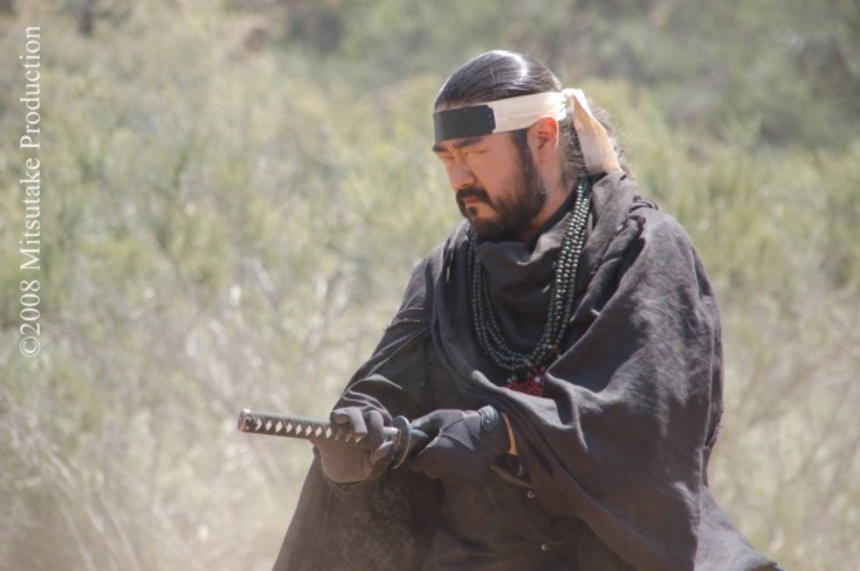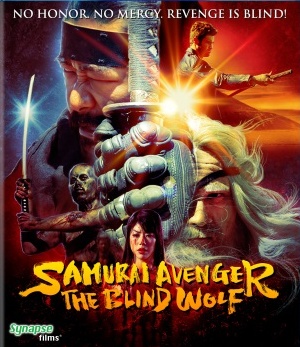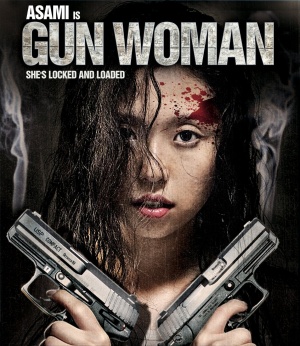Interview: SAMURAI AVENGER: THE BLIND WOLF's Kurando Mitsutake On His Journey From Japan To The USA And Back Again

The first time I saw Samurai Avenger: The Blind Wolf was at the Asian Film Festival of Dallas in 2009. What's been going on in the meantime with the film between the time the film was finished and this Blu-ray release.
Back in 2009 it [Samurai Avenger: The Blind Wolf] did have an unintentionally limited DVD release. This distribution company [who Mitsutake declines to mention] bought it for a lot of money but they didn't promote it at all. So the tree fell in the woods and no one heard it. The DVD was available in '09 but no one knew about it. Then the company tanked early last year and they were going to take the movie with them, so I had to hire a lawyer to get the rights to the movie back, which I was able to do and Synapse wanted it for the re-release and I was happy to give it to them because they are such cult specialists.
This is an unusual case of Synapse releasing a contemporary film [on Blu-ray].
Synapse wanted Gun Woman, that's why they approached me. Unfortunately, I don't own the rights to Gun Woman, the production company in Japan does. I told them, "Hey, I just got back the rights to my other film, Samurai Avenger, do you guys want to distribute this instead?" They took a look at it and were happy to have it.
Samurai Avenger, with its East/West flavor is a great fit for Synapse, who've got a great line of Asian Cult Cinema already.
Synapse Films is the best company for the Samurai Avenger US release. They really took their time to restore it with a new HD conversion. We shot this movie back in 2008, so the movie itself is in HD, but the behind the scenes stuff is standard definition. They really took great care of the behind the scenes documentary and I really think it looks the best it ever has on Blu-ray.
I know you were born in Japan and are now based in the States.
Yes, I was born in Japan, in Tokyo. In the '80s when I was growing up the Japanese domestic film scene was kind of small. The Golden Era of Japanese film was long gone when I was growing up, and it was the time of the home video boom. I grew up watching mostly Hollywood movies. Everything from blockbusters to b-movies and z-movies, you name it. So I developed an infinite love for American movies. Because of this I wanted to study American filmmaking pretty early on, I knew I wanted to learn the American style of making movies when I was in grade school, around 7th or 8th grade. I had the opportunity to come over to the US as an exchange student when I was in high school. At the end of my high school program, I applied to art school in the States and I was accepted and I stayed here.
You mentioned your love for American films, but I spotted a lot of Japanese influences as well. Were you watching a lot of Japanese films growing up as well?
It's kind of interesting. When I moved to a foreign country as a young person, my American friends wanted to learn about Japanese movies from me, but all I knew were American movies. It was kind of embarrassing, "Oh shit! I haven't seen Kurosawa, I haven't seen Ozu." So when I went to college, my first college the San Francisco Art Institute, I rented all of the Japanese classics, along with obscure action flicks from the '70s, stuff like that. I had to re-educate myself with Japanese cinema during my college days. I really fell in love with those, and that's how I became familiar with them.
Of course I covered Kurosawa and Mizoguchi, but I also covered someone like Kihachi Okamoto (The Sword of Doom, Kill!), another great Japanese director who specifically made tongue-in-cheek action movies and really interesting samurai movies. Of course, I was always influenced by program pictures like Lone Wolf and Cub and the Zatoichi series, those were the main influences for Samurai Avenger.
You can certainly tell. In some of the behind the scenes material on Synapse's disc we get to see some of your early student films that focus a lot on swordplay and samurai themes.
When you move to a foreign country, you need to be able to capitalize on your heritage. Being Japanese, not Japanese-American, but Japanese-Japanese living in the States, what people wanted to see from me was Japanese themed stuff, so I went in that direction.
It seems to be working so far.
Well, I learned that the hard way, too. My first feature, Monsters Don't Get to Cry, is only available in Japan on DVD, and it was a revenge themed film set around a fictional high school shooting. The American father of a girl who was a victim of the shooting kidnaps the perpetrator and tortures him to squeeze an apology out of him. That film didn't do well at all, either in the film markets or at film festivals. The reaction I got was, "what is this Japanese director doing with American themed stuff?" So I shopped the movie around, but I heard a lot of people saying "you're Japanese, you should do samurai movies or ninja movies to capitalize on your background." That was the biggest advice I got from that experience, so when I made my second feature, I knew I wanted to do a samurai film or a swordplay film.
There has always been a tight connection between samurai films and American and Italian westerns. What were your biggest influences among Westerns going into Samurai Avenger?
Sergio Leone's influence is undeniable, but my personal favorite is Sergio Corbucci. The Great Silence is one of my all time favorite Spaghetti Westerns.
There's a great shot of one of the assassins in Samurai Avenger dragging coffins into a town square a la Corbucci's Django.
Yeah, it was kind of unfortunate timing. Tarantino had just made Kill Bill [in which Uma Thurman's character has to fight her way through several assassins to get to Bill], and Miike's Sukuyaki Western Django [a Spaghetti Western made by a Japanese director] came out around the same time. A lot of people thought I was a copycat, but I had the concept for Samurai Avenger long before those films were even talked about. Because they [Tarantino & Miike] are so much bigger than I am, they can move from concept to screen much faster than I can.
 [Here I get distracted] The cover art from Samurai Avenger is really cool, too.
[Here I get distracted] The cover art from Samurai Avenger is really cool, too.I sent Synapse a bunch of art that I had, and this original design was actually done by my brother-in-law. Then Synapse's art guy (Wes Benscoter) gave it the look of a painted poster. Yeah, it's great, it looks like Star Wars Episode 9 or something.
It's a big week for you because your film Gun Woman is also releasing, and that's much more recent.
Yeah, we shot that in 2013, released on the festival circuit in 2014, and this is the end of its release cycle. We're winding down from that one and getting ready to move on with the next thing.
While Samurai Avenger is deeply anchored in American and Italian westerns, Gun Woman is definitely influenced by the '80s Cannon action films and DTV movies that flew off video store shelves when we were kids.
That was definitely the intention. With Samurai Avenger, I did my "hats off" to '60s and '70s movies, so I wanted to do my homage to '80s movies with Gun Woman.
One of the elements that works really well in both films in very different ways is that they have amazing scores. Both scores were created by the same guy, right?
Yes, they're both by Dean Harada, a Japanese-American composer from Hawaii. We met through my DP on Samurai Avenger (Nakahara Keiko), they worked together on a short film before Samurai Avenger. I fell in love with his music and sensibilities and we're really a tight unit, he's going to score my next movie as well.
He gets it. Basically, I just have to give him a name. With Samurai Avenger I said, "Ennio Morricone," and he gets it, with Gun Woman, I said "Giorgio Moroder".
Gun Woman features ScreenAnarchy favorite Asami (Machine Girl, etc), who is able to show of some acting chops for one of the first times even without any lines.
That's one of the things that Asami and I talked about. She's a genre queen in Japan and she's done most of the things an actress can do in her career already. I always saw her as a great performer while most other directors in Japan use her as comic relief as a crazy over the top chick in a single sequence or something like that. That's great, because she can deliver that performance she's counted on, but she wanted to do something different.
With Machine Girl and the other films like that she's a great character, but she's not the lead. She really wanted to have her own picture where she was the star. She came to me and wanted to collaborate and said, "I need a calling card. I need a movie where I'm the star, I want to get out there as a leading action actor."
I told her that I had this idea for a film [Gun Woman], and I told her that for the last half hour of the film she was going to be completely naked and killing a lot of people, and she said, "yes!"
With this film Asami seems to have taken up the long abandoned mantle of someone like Meiko Kaji or Reiko Ike, a female action star like we haven't seen from Japan in a long time.
 If she were here she would jump up and give you a big hug and a kiss because those actresses are her heroes. Reiko Ike is one of her heroes, and Asami certainly doesn't want to be those actresses, but she wants to be the 21st century version of someone like that, a female action queen. She feels like Gun Woman has given her the first big step towards that goal.
If she were here she would jump up and give you a big hug and a kiss because those actresses are her heroes. Reiko Ike is one of her heroes, and Asami certainly doesn't want to be those actresses, but she wants to be the 21st century version of someone like that, a female action queen. She feels like Gun Woman has given her the first big step towards that goal.Japan hasn't really had a big female genre icon like that since those days.
Well, it's a bad time for the business climate in Japan. The censors are getting tougher and the economy is getting worse and worse. The problem for the Japanese film industry is that Japanese kids just aren't watching movies. They're too busy tweeting or facebooking, consequently the b-movies are getting smaller and smaller. Some of my friends working in Japan have to deliver straight to video b-movies with a $30,000 budget. No one is getting paid, they have to shoot a feature in two and a half days, they are suicide missions.
That brings up an interesting question. Do you see yourself directing a film in Japan with that climate, or do you feel like you've found where you belong in the States?
I would love to shoot a movie in Japan. I'm actually attached to an anthology feature in Japan. Three directors are working on this film, and I'll be directing one of the stories, along with some pretty well known Japanese genre directors. That film will be shot entirely in Japan and will be my first picture shot entirely in Japan. I'm very excited about it.
Will you be using some of your stable of regular performers, like Noriaki Kamata (the villain in Gun Woman) and Asami, in your new projects?
Yes. I can safely say that Noriaki is coming back to play another wicked character in my new movie and I'm happy to announce that Asami is coming back to play a big, big role in my new movie.
Is this the anthology or a new feature?
The feature. I can't disclose the title yet, but the new feature is going to be a martial arts movie. It's a project that was offered to me out of the blue. I didn't develop this one like the other ones, but they're letting me write the script so it's going to be my vision, my concept.
This amazing martial artist from Japan was presented to me, and my mission is to make him a movie star. He's amazing, he does karate, but it's a karate that no one has seen before. Kind of a dark side of karate, a pure assassination karate and I'm super excited.
For anyone who hasn't seen your films, do you think you could give our readers a comparison point? If you liked ...., you might like Samurai Avenger; if you liked ...., you might like Gun Woman.
Well, for Samurai Avenger: The Blind Wolf, if you like any Japanese samurai movies. From Kurosawa to Shintaro Katsu (Zatoichi), or Lone Wolf and Cub. If you like any of those Japanese genre films, give Samurai Avenger a shot, I think you'll really enjoy it.
For Gun Woman, if you like Cannon films, some Peckinpah movies, Clint Eastwood's movies from the '80s, definitely give it a shot.
I think they're really good hybrid genre films for the 21st century.
One other thing I wanted to mention was the really awesome Samurai Avenger: The Blind Wolf Synapse Blu-ray is the feature length behind the scenes documentary.
My day job out of film school was making behind the scenes documentaries and doing audio commentaries for New Line Cinema. So, the behind the scenes supplemental stuff was in my blood. So when I did Samurai Avenger I insisted to my producers to make a feature length documentary on the making of this feature so that any independent filmmaker, shoestring budget filmmakers, who wanted to know about what goes on behind the scenes of making an independent movie, they can look at this feature length documentary and they'll be on their way.
This doc definitely shows a lot more than your average EPK (Electronic Press Kit) that most films get.
Yeah! Of course, the feature was my passion, but the behind the scenes documentary was almost as important. I would love it if any kids out there who want to make their first feature, I would love if they picked up a copy of Samurai Avenger and check out the behind the scenes documentary. I think they'll learn a thing or two.
I totally agree.

Do you feel this content is inappropriate or infringes upon your rights? Click here to report it, or see our DMCA policy.






